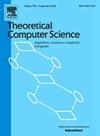具有概率调度功能的群体协议中的隐私问题
IF 0.9
4区 计算机科学
Q3 COMPUTER SCIENCE, THEORY & METHODS
引用次数: 0
摘要
人口协议模型 [2] 为设计和分析资源有限的移动代理之间的分布式算法提供了一个理论框架。虽然最初的群体协议模型考虑了匿名的概念,但对隐私问题的研究并不深入。然而,如果要在传感器网络、物联网设备和无人机等处理敏感数据的环境中实施这些算法,就需要在群体协议模型中采用具有时间和空间效率的隐私保护技术。在这项工作中,我们介绍了几种正式的隐私定义,从仅保证群体输入向量的可信可抵赖性,到完全的信息论保证,即代理的输入和输出以外的知识不会对特定输入向量的概率产生影响。然后,我们将这些定义应用于现有协议和新型协议。我们证明,[9] 中的余数计算协议(已被证明在对抗调度下满足输出独立隐私)在概率调度下不具有信息论上的隐私性。与此相反,我们提供了一种新算法,并证明它能在概率调度条件下正确地、从信息论角度私密地计算余数。本文章由计算机程序翻译,如有差异,请以英文原文为准。
Privacy in population protocols with probabilistic scheduling
The population protocol model [2] offers a theoretical framework for designing and analyzing distributed algorithms among limited-resource mobile agents. While the original population protocol model considers the concept of anonymity, the issue of privacy is not investigated thoroughly. However, there is a need for time- and space-efficient privacy-preserving techniques in the population protocol model if these algorithms are to be implemented in settings handling sensitive data, such as sensor networks, IoT devices, and drones. In this work, we introduce several formal definitions of privacy, ranging from assuring only plausible deniability of the population input vector to having a full information-theoretic guarantee that knowledge beyond an agent's input and output bear no influence on the probability of a particular input vector. We then apply these definitions to both existing and novel protocols. We show that the Remainder-computing protocol from [9] (which is proven to satisfy output independent privacy under adversarial scheduling) is not information-theoretically private under probabilistic scheduling. In contrast, we provide a new algorithm and demonstrate that it correctly and information-theoretically privately computes Remainder under probabilistic scheduling.
求助全文
通过发布文献求助,成功后即可免费获取论文全文。
去求助
来源期刊

Theoretical Computer Science
工程技术-计算机:理论方法
CiteScore
2.60
自引率
18.20%
发文量
471
审稿时长
12.6 months
期刊介绍:
Theoretical Computer Science is mathematical and abstract in spirit, but it derives its motivation from practical and everyday computation. Its aim is to understand the nature of computation and, as a consequence of this understanding, provide more efficient methodologies. All papers introducing or studying mathematical, logic and formal concepts and methods are welcome, provided that their motivation is clearly drawn from the field of computing.
 求助内容:
求助内容: 应助结果提醒方式:
应助结果提醒方式:


